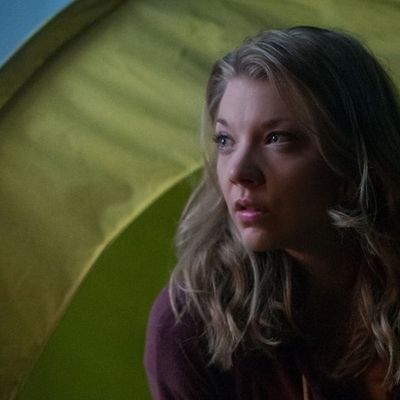
The Aokigahara “suicide forest” near Mt. Fuji in Japan is a real place where dozens of individuals go to kill themselves every year — the kind of setting that’s probably irresistible to certain authors and artists and filmmakers. But you have to be careful around this sort of thing, as evidenced by Jason Zada’s new horror film The Forest. The horror genre gives us kicks out of things that in real life are almost too distressing to complicate: deranged serial killers and monsters from the beyond and what-have-you. Suicide, however, feels less abstract, less otherworldly — closer to home, maybe, a real thing of sadness. For some of its running time, The Forest plays with that idea, which unfortunately just serves to make its eventual descent into lame horror histrionics that much more disappointing.
But it starts reasonably well. Our heroine, Sara (Natalie Dormer) gets news that her troubled twin sister Jess, working as a teacher in Japan, was last seen in the Aokigahara forest. Jess has often had a fascination with suicide and mortality, the result of a childhood trauma involving their parents’ violent death. (Sara says it’s a car accident, but the little glimpses we see of it suggest it’s something else.) The psychic connection between the two girls convinces Sara that her sister needs saving. She can sense both that this is more than one of Jess’s typical morbid obsessions, and also — crucially, because we’re told the police give up searching for someone in Aokigahara 48 hours after they disappear — that she’s still alive.
The early scenes of Sara in Japan have an interestingly alienating quality, as if the melancholy of her predicament is reflected in the unreal, distant hum of the city around her. (And, yes, the film has to indulge in a lot of cliché Americans-in-Japan tropes, but that’s pretty common in horror, which often turns on sending its characters into settings that are other to them.) A scene in which she goes to visit the school where Jess taught is briefly chilling, as the students freak out at seeing their lost teacher’s likeness. If only the movie had consisted of just these kinds of sights and sounds, and had forsaken characters and plot entirely. At a bar in Japan, Sara hooks up with a bro-ish Australian travel writer Aiden (Taylor Kinney), and their interaction has less to do with Sara’s need to connect and more with the film’s need to have someone there with whom she can exchange vaguely explanatory dialogue.
Eventually, Sara and Aiden find themselves in the forest itself, along with a Japanese guide (Yukiyoshi Ozawa). That’s when the film, apparently left with little else to do, starts piling on the cheap, ineffective scares. For every occasionally unsettling image the film gives us — in one of her visions, Sara’s veins seem to pullulate with maggots — it gives us ten that are laughably uninspired. The inconsistent storytelling doesn’t help, either. Several supposed resolutions near the end are left hanging, as if they were vestiges of plot threads that got “streamlined” in post-production.
The Forest is a fairly dumb movie, but dumb movies, experience shows us, can often be quite scary. More than anything here, though, one senses a film at war with itself. The concept promises us a melancholy kind of dread, and there are bits and pieces throughout of the movie The Forest could have been. But any compelling sense of unease is ultimately undone as the film gradually settles for tedious schlock.





